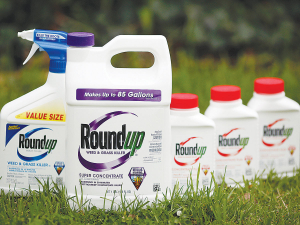Greenpeace fearmongering on glyphosate - Feds
Federated Farmers says climate protest group Greenpeace is manufacturing outrage and attempting to scare New Zealanders with headlines that have no basis in science.
 European farmers fear that a ban on glyphosate would see their crops taken over by deep-rooted weeds.
European farmers fear that a ban on glyphosate would see their crops taken over by deep-rooted weeds.
Glyphosate use in Europe has resulted in reassessments, reviews and bans in some countries, causing a backlash by farmers. The controversial herbicide is touted by NZ Professor of Toxicology Ian Shaw as a victim of its own success.
It's successful because it is the most widely used herbicide in the world, it is versatile, and its use can benefit the environment.
Conversely, its use has ignited heated debate around the globe, with many having their own slant on its safety, often resulting from conflicting reports and limited understanding of the science behind its use.
As the renewal of the EU authorisation of glyphosate looms, European farmers fear that a ban on glyphosate would see their crops taken over by deep-rooted weeds and suffer quality losses, alongside a reduction in farm productivity. Environmentalists are concerned about an increase in carbon emissions and a detriment to soil health and erosion.
The prospect of a ban on glyphosate is placing enormous pressure on European farmers. They would face substantial weed pressure, as weeds compete with crops for light, water and nutrients. An even greater pressure exists with climate change and the need for farming practices to become more sustainable. Taking this vital tool away from farmers would lead to more mechanical weeding, more time spent ploughing, and more money spent on fuel alongside the environmental impacts.
Farmers concede that minimal glyphosate use is possible, but an outright ban will be catastrophic because it would entail more tillage to manage weeds - leading to soil degradation. If glyphosate is not available, farmers would need to use three to four other herbicides in its place, leading to more tillage and more resources to manage weeds.
The other complication and contradiction to current environmental goals is the contribution that tillage makes to climate change.
Plants absorb carbon dioxide from the atmosphere through photosynthesis and pass carbon to the ground when dead roots and leaves decompose. Tillage releases this carbon from the soil to the atmosphere, contributing to global warming.
Tillage fractures the soil, disrupting soil structure, accelerating surface runoff and soil erosion. It also reduces crop residue, which helps cushion the force of pounding raindrops. Without crop residue, soil particles become more easily dislodged, being moved or 'splashed' away.
Soil degradation starts after rainfall, with run off entering nearby streams, gullies and rivers. The sediment in the water turns it brown and is eventually released into the seas, affecting sea life. Soil degradation from erosion is very expensive for Europeans, costing up to 14 billion euros annually.
Farmers need the best tools and technological solutions to grow enough crops, using fewer natural resources to produce sufficient high-quality food, respect the environment, safeguard consumers and support themselves. Allowing them to use the right tools at the right time for the right crops will assist them to do this.
Helping farmers build a stronger and more resilient agricultural economy, requires an open and transparent dialogue and collaboration between scientists, academia, innovators, politicians, regulators, NGOs and all along the food value chain from farmers to consumers.
Mark Ross is chief executive of Agcarm, the industry association for companies which manufacture and distribute crop protection and animal health products.
Controls on the movement of fruit and vegetables in the Auckland suburb of Mt Roskill have been lifted.
Fonterra farmer shareholders and unit holders are in line for another payment in April.
Farmers are being encouraged to take a closer look at the refrigerants running inside their on-farm systems, as international and domestic pressure continues to build on high global warming potential (GWP) 400-series refrigerants.
As expected, Fonterra has lifted its 2025-26 forecast farmgate milk price mid-point to $9.50/kgMS.
Bovonic says a return on investment study has found its automated mastitis detection technology, QuadSense, is delivering financial, labour, and animal-health benefits on New Zealand dairy farms worth an estimated $29,547 per season.
Pāmu has welcomed ten new apprentices into its 2026 intake, marking the second year of a scheme designed to equip the next generation of farmers with the skills, knowledge, and experience needed for a thriving career in agriculture.
OPINION: Staying with politics, with less than nine months to go before the general elections, there’s confusion in the Labour…
OPINION: Winston Peters' tirade against the free trade deal stitched with India may not be all political posturing by the…